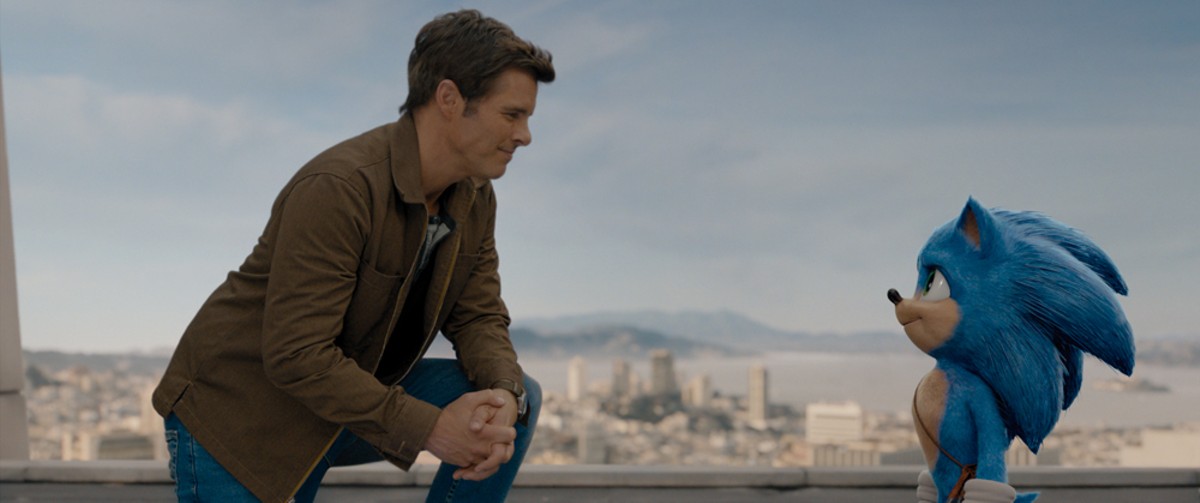Covering movies regularly means that with certain works you learn to brace yourself, expecting the worst — only to sigh with relief when they don't go all that wrong. Sonic the Hedgehog is just that kind of thing. Recasting the chatty, high-speed rodent as a lonely alien refugee desperate for both amusement and camaraderie, Sonic quickly adopts the structure of a halting, but watchable buddy comedy built around its mascot and James Marsden's Tom Wachowski, a small-town cop who Sonic idolizes and then befriends. It's just one that happens to feature a villain, some Easter eggs for longtime fans, and a shaggy-dog sort of plot.
Set for most of its duration not in the San Francisco of its trailer but in Green Hills, Montana (the crew actually shot around Vancouver), Sonic pitches its lead's earthbound existence in the first act as a lonely one. Sonic lives in secret, off the grid, in a treehouse stocked with Flash comics, beanbags, and other pop-cultural loot. Interacting with Green Hills' human population only as a prankster and longing voyeur, he causes minor trouble for various residents, watches Speed and Fast movies when the locals do (eerily, through their open windows), and babbles to himself to fill the air, as well as the film's own running time. Essentially a hyper kid playing make-believe compulsively, he daydreams about others' circumstances, role-playing therapy sessions, baseball games, and other activities I'd not regard romantically — and does so in relative peace, until his powers cause an accidental disturbance that catches the eye of the U.S. government.
Enter Jim Carrey, as Dr. Robotnik, a vindictive but ostensibly brilliant government roboticist, whose extravagant mustache and Richard Spencer-like haircut mark him as a sinister, elitist dandy, and rationalizing the video game villain's roguish self-involvement as the vengeance of an underappreciated nerd. (Spoiler: Like Spencer, he, too, gets punched in the face.) Though the character's out to capture the titular hedgehog for scientific purposes, Carrey himself is around to chew the scenery. Spending the film shrieking, laughing to himself, and dancing alone, Robotnik proves intermittently funny, but more frequently unsettling, belittling both Wachowski and his own helpers between ordering drone strikes and mouthing lines like "Ready the prototype."
But Robotnik's cardinal sin, per the film's bizarre logic, lies in his latte-loving failure to appreciate the virtues of small-town life. Demeaning Wachowski and Green Hills' other residents as backward and corn-fed, the urban-rural dialectics onscreen were pronounced enough for me to write down during the movie: is Robotnik a coastal elite?? Arguably a roguish agent of "big government" gone amok and so cold as to call the film's one-horse town dull, Robotnik seems to earn the ire of director Jeff Fowler, who frames the inherent virtues of small-town American life as unquestioningly as he does Tom Wachowski's employment as a cop. The film finds Tom and his wife, Maddie (Tika Sumpter), weighing a move together to San Francisco — Tom wants to see some action, and Maddie's sister lives out there. Once heard of, the notion positively horrifies Sonic, who at once craves stimulation and serves as the film's chief evangelist for the sanctity of quiet rural life. How, he wonders, could they possibly hope for anything better? What could possibly be more idyllic than what they already know?
This sinful want is confessed to Sonic on a road trip he and Tom take together, chasing an obvious MacGuffin to San Francisco. This brightly colored, sunlit journey, which imposes on the film's middle section a familiar, if nonsensical, frame (why doesn't Sonic just run there?), also provides excuses for gags and action scenes. A bar fight, some motel-room banter, and a chase scene all serve to burn through screen time while generating set-pieces dipped in set-dressed Americana. But what really stands out across the trip — as Fowler cuts between Robotnik raving in his mobile, Winnebago-sized base and Tom and Sonic in a pickup — is the preponderance of characters talking to themselves.
Like most buddy films, Sonic is nominally about friendship, but its production is marked, like so many big-budget movies lately, by actors speaking to CG-generated characters to be added to the film later, performing often in front of green screens. (Similar to the disgust with the eerie, uncanny valley-quality of last year's CATS, negative fan reaction to Sonic's trailer caused the studio to make the hedgehog cuter for the theatrical release.) It's impossible for me, in watching, not to connect Sonic's lonely, pitiable rambles to himself with the humiliating pickle of the film's lead actors. Whether it's James Marsden, consigned to driving around empty highways talking to "Sonic" but actually to himself, or solitary Jim Carrey, raving as he spins gleefully in his chair, there's a sad sense across the film's performances of talking to — and needing — an imaginary friend: of pervading, digitized isolation even for the film's human beings, and adults. The difference between them lies in their respective responses: where Sonic and Tom reach out, Dr. Robotnik cruelly lashes, castigating even his assistant, Stone (Lee Majdoub), who appears to be doing his best. But even in Tom's case, the film pitches less the kind of adventure a road-trip or video-game adaptation might imply than the value of nostalgic reference, domesticity, and homey, small-town comforts. Even with this suggestion, there is beneath the film's thin fabric an existential dimension — an expression, probably accidental, that its quips fail to effectively conceal. Though it's deliberately shallow and eager to be liked, what proves most interesting about the film is its version of companionship and desire for familiar comfort, which both feel like a form of desperate clinging. Though better and more winning than what might have been expected, Sonic's a little too unwitting to outrun its own self.
Stay on top of Detroit news and views. Sign up for our weekly issue newsletter delivered each Wednesday.






